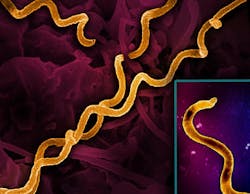The National Institutes of Health’s National Institute of Allergy and Infectious Diseases (NIAID) has awarded grants for 10 projects to improve diagnostic tools for congenital and adult syphilis—conditions currently diagnosed with a sequence of tests, each with limited precision.
The new NIAID grants explore a range of immunologic and diagnostic concepts, including basic research to improve understanding of infant immune responses to syphilis, novel tests to identify different parts of T. pallidum genomic material in infants and adults, measures of antibiotic resistance in T. pallidum strains, and testing platforms that are feasible to use at the point of care rather than an off-site laboratory. With a cumulative $2.4 million in funding distributed across recipients, the awards are as follows:
Magic Lifescience, Inc., Mountain View, California
Project title: Development of a novel syphilis molecular diagnostic assay for a point-of-care multiplexed genital ulcer panel test on giant magnetoresistive biosensors
Principal investigator: Elaine Ng, Ph.D. (early-stage investigator)
Grant: 1 R21 AI185972-01
Research at Nationwide Children's, Columbus, Ohio
Project title: Interrogating infant immune responses for diagnosis of congenital syphilis infection
Principal investigator: Masako Shimamura, M.D.
Grant: 1 R21 AI186003-01
University of California San Francisco
Project title: Multi-omic approaches to identify novel biomarkers for the diagnosis of syphilis in pregnancy and assessment of treatment response
Principal investigator: Stephanie Gaw, M.D., Ph.D.
Grant: 1 R21AI186006-01
University of Texas at Austin
Project title: A triad approach towards improved diagnostics for maternal and congenital syphilis
Principal investigator: Sanchita Bhadra, Ph.D. (early-stage investigator) with Randolph Hubach, Ph.D., M.P.H. (Purdue University)
Grant: 1 R21 AI185965-01
University of Texas Southwestern Medical Center, Dallas
Project title: Pre-analytic factors affecting molecular tests for congenital syphilis
Principal investigator: Jeffrey Sorelle, M.D. with Emily Adhikari, M.D.
Grant: 1 R21 AI185968-01
University of Victoria, British Columbia, Canada
Project title: Development of a direct diagnostic test for infectious and congenital syphilis
Principal investigator: Caroline Cameron, Ph.D.
Grant: 1 R21 AI186005-01
University of Washington, Seattle
Project title: Rapid and ultrasensitive aptamer-based detection technologies for T. pallidum Principal investigator: Stephen Salipante, M.D., Ph.D.
Grant: 1 R21 AI184484-01
University of Washington, Seattle
Project title: Rapid point-of-care detection of T. pallidum resistance to macrolides and tetracyclines by multiplexed loop-mediated amplification (LAMP)
Principal investigator: Joshua Lieberman, M.D., Ph.D. (early-stage investigator)
Grant: 1 R21 AI184749-01
University of Washington, Seattle
Project title: Sensitive Treponema pallidum genome recovery through tiling amplicon sequencing
Principal investigator: Alexander Greninger, M.D., Ph.D., M.S., M.Phil.
Grant: 1 R21 AI185726-01
Virginia Polytechnic Institute and State University, Blacksburg
Project title: Released peptidoglycan fragments are a biomarker for early stages of syphilis
Principal investigator: Brandon Jutras, Ph.D.
Grant: 1 R21 AI185998-01

